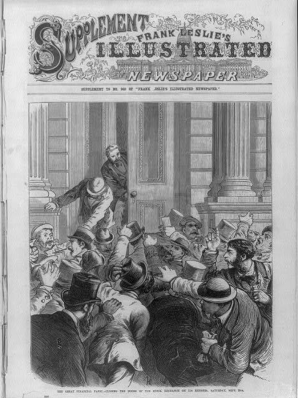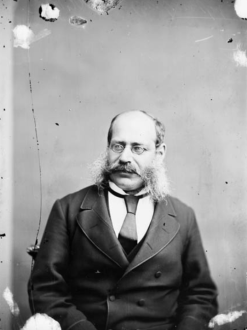Remember This? The Long Depression hits Ottawa
Posted Mar 29, 2021 01:53:00 PM.
CityNews, in partnership with the Historical Society of Ottawa, brings you this weekly feature by Director James Powell, highlighting a moment in the Ottawa's history.
April 5, 1877
When we think of an economic depression, we usually think of the Great Depression that started in late October of 1929 with the New York stock market crash and lasted through the “Dirty Thirties.” But there was another global economic downturn, sometimes called the Long Depression, that started with the Panic of 1873 and lasted until 1896 according to some historians.
Like the Great Depression, it resulted from a combination of real, financial and monetary factors.
It began in central Europe with a stock market crash in Vienna, then the capital of the Austro-Hungarian Empire. The bursting of a speculative bubble revealed overextended financial institutions and stock market manipulation, leading to bank failures and corporate insolvencies. The financial impact rippled across international borders and even the Atlantic. (Sound familiar?)
In North America, there had been a huge overinvestment in railways—the “dotcom-like” speculative investment of the nineteenth century. Many of the railway companies had raised large sums of money based on unrealistic expectations of future profitability.
In September 1873, Jay Cooke & Company, a large U.S. bank and a major investor in railway bonds, failed. This sparked a financial panic in New York. Share prices collapsed. The stock exchange closed for ten days. In the months that followed, dozens of railway companies failed, bringing down financial institutions in their wake.

Closing the doors of the New York Stock Exchange, 20 September 1873, Picryl
These developments happened against the backdrop of a global economy undergoing major structural changes.
The industrial revolution was in full swing. Germany and the United States were challenging Britain’s economic supremacy. New industries and new production processes were rapidly overturning the old economic order. Productivity was rising and prices for industrial and agricultural goods were falling. While many took advantage of the opportunities being created and prospered, those who were unable to adapt to the rapid changes suffered.
Added to these shocks in North America was the impact of the epizootic of 1872-'73—an equine flu that started outside of Toronto and spread across Canada and the United States. While the mortality rate was typically low, few horses outside of certain isolated regions were spared. It took weeks for stricken equines to recover, with crippling consequences for an essentially horse-drawn economy. Even the railways were affected as coal was shipped to rail terminals using horse-drawn wagons.
Governments did little to ease the pain of the downturn in economic activity. The idea of government assistance for the poor was still in the future.
With all major countries, including Canada, wed to the gold standard, there was also little scope for monetary action to support economic activity, even if central banks (if countries had them) wanted to do something.
Meanwhile, the United States joined gold standard countries in 1873, after having had an unbacked fiat currency since the start of their civil war. It ended the unlimited coinage of silver (the Crime of ’73 according to silver supporters) which might otherwise have led to lower interest rates. Protectionist sentiments rose everywhere. The major countries, with the exception of Britain, adopted high tariffs in an effort to protect domestic industries and jobs. International trade suffered.
Canada was in the thick of all these trends.
As is the case today, it was a small economy closely linked to its southern, much larger, neighbour. When the United States entered the Long Depression, so did Canada. To make matters worse, the United States had abrogated its trade reciprocity deal with Canada a few years earlier. Although the reciprocity agreement only covered natural resources, this mattered especially for Canada.

Hon. Sir Richard Cartwright, 1881 Topley Studio Fonds Library and Archives Canada, PA-025546
In February 1876, Richard Cartwright, the Liberal Minister of Finance, attributed the ongoing depression in Canada to: poor U.S. economic conditions, which were “visibly affecting Canadian interests;” overlarge imports; excessive inventories which were depreciating in value; greedy banks who extended loans “to men of straw, possessing neither brains nor money;” and a depression in the lumber trade owing to “inexperienced operators unable to compete when U.S. prices fall.”
To help ameliorate matters, he said that the government was taking advantage of cheap labour and materials to bring forward public works projects. Cartwright, a proponent of free trade, resisted calls for tariffs on manufactured goods beyond those necessary for revenue purposes on the grounds that manufacturing employment accounted for only 40,000 jobs. The government needed to look after the interests of the other 95 per cent of the working population.
In Ottawa, matters came to a head in early 1877.
Unemployment, which was always high in winter, owing to the seasonality of many jobs, was worse than usual. Each morning, hundreds of unemployed, able-bodied men congregated in the ByWard Market looking for an hour or two of work.
Times were tough even for those who had jobs. Pay had been reduced from $1.25 per day to a meagre 90 cents per day.
On April 5, 1877, 200-300 unemployed men assembled as usual early in the morning in the ByWard Market looking for work. When little was forthcoming, they decided they would do something about their situation. Perhaps the Mayor of Ottawa, William Waller, would be able to able to provide work or bread.
The men marched on City Hall on Elgin Street.
Unfortunately, the mayor was absent. A messenger was dispatched to find him. Meanwhile a Citizen reporter interviewed some of the men while they waited. Their stories were dire. Many had large families to feed but had been out of work for months. Starvation stared many in the face. Peter Boulez had a family of twelve, but had had no employment since the previous November. With his limited savings exhausted, he needed to find work to put bread on the table. Hans Shourdis had been living off of soup for the past four months, “his stomach a stranger to meat.” Christmas had been his last satisfying meal. A kindly lady had given him charity but that all went to his five children.
When Mayor Waller appeared, he said that he deeply sympathized with the workmen. However, he reminded them that the depression was being felt across the country, and opined that the Dominion government was not responsible for the hard times.
He announced that City Council would be meeting on the following Monday to discuss a drainage scheme worth $300,000, one third of which could be expended annually. This project would hire a lot of citizens in need. He expected work to proceed as soon as the frost was out of the ground. The Mayor also said that he had instructed the City Collector not to go after the unemployed for unpaid taxes until they had work.
The men next marched on the Parliament Buildings to seek an immediate interview with Premier Alexander Mackenzie, whose Liberal Party had come to power in November 1873, virtually at the onset of the depression—a timing that had not gone unnoticed by the unemployed workers.
At the main entrance of the Centre Block, the men sent a messenger to the Premier who was in the Railway Committee Room attending a meeting of the House Banking and Commerce Committee.
When Mackenzie refused to see them, the unemployed workers entered the building and approached the Committee Room’s entrance. They sent another messenger to Mackenzie. When nothing happened, two of the workers’ leaders opened the door, insisting to see the Premier. When a committee member shouted “Shut the door,” the door was closed in their faces. Indignant, some of the workers suggested starving them out “like they did at Sebastopol” during the Crimea War. Others forced the door to great cheers, including cheers for Sir John A. Macdonald, Mackenzie’s arch rival.
Needless to say, committee members were shaken by this invasion.
Some apparently thought the men were there “to wipe them out.” However, others regained their composure and said that the men were harmless. They simply wanted to speak to Mr. Mackenzie.
One of the unemployed men stood on a table and addressed the crowd. He was angry that the Premier had eluded them, calling it “a hardship and an insult.” Peter Mitchell, the MP for Northumberland County, New Brunswick, and a Father of Confederation, calmed them by saying that the Premier would no doubt give an interview at some other time and place. After giving three more cheers for Sir John A. Macdonald, the unemployed men left though not before issuing a statement:
“That we the unemployed workingmen of Ottawa, strongly censure the Hon. Alexander Mackenzie for refusing to meet a delegation sent from among us to ask his opinion as to the chances of work during the coming season. And we condemn him for allowing a door to be slammed in our faces, and call upon the workingmen of the Dominion to join us in rebuking the treatment received by us.”
The men made an orderly departure from Parliament, committing themselves to meet again in the market later that day to plot strategy.
That evening, the men, along with political representatives from all levels of government, met outside in the Market Square despite a light rain. Plans to meet in the Market Hall had been foiled by locked doors and a missing key.
There was a number of rousing speeches. Mr. Bullman, the self-appointed chairman of the men, spoke on “how the wealth of the world was unequally distributed” and how the poor were oppressed. He said that he had been splitting hardwood for 25 cents a cord and had to feed a family of small children. (His credibility was later damaged when it was revealed that he was not unemployed, and had left a job at the gas works to attend the meeting.) A Mr. Hans added that “it was natural for money to flow into the rich man’s pocket as it was for the water of the St Lawrence to flow into the ocean.” At the end, it was agreed to send a deputation to approach Mackenzie on behalf of the workers.
At 9 a.m. the next morning, a crowd of more than 600 gathered in front of the City Hall and marched to the West Block on Parliament Hill, the location of Premier Mackenzie’s office. The deputation, which comprised the City of Ottawa’s two MPs, one Liberal the other Liberal-Conservative, the Liberal MPP for the City, Mayor Waller, and Mr. Bullman, met with the Premier. This time, Mackenzie agreed to address the men.
The Premier offered the unemployed little in the way of government relief.
He claimed that government was “powerless” beyond commissioning public works, pointing to the Welland and Lachine Canals. He also argued that aid should come from the provincial legislature and local charities. Just because Parliament resided in Ottawa was not a reason for the Dominion government to support Ottawa employment. If a man needed a job, he should go to the North-West Territories (Alberta and Saskatchewan) where he could get 100 acres of good farmland for nothing. However, Mackenzie promised that members of Parliament would personally donate as much as they could afford to relief efforts. He was also sure that the Ottawa men’s suffering was only temporary.
The Premier’s response did not go over well. There were more meetings, marches and speeches during the days that followed.
The unemployed men sent a “memorial” (an archaic term for a public letter) to the Senate demanding government action in Ottawa and the surrounding area for public works to provide jobs and alleviate distress.
Mayor Waller distributed “bread tickets” to the most urgent cases, while City Council expedited expenditures on the drainage project. A large number of men were put to work clearing out the Rideau Canal’s Basin. A relief fund was organized into which the Ottawa area’s more wealthy citizens contributed, including Alonzo Wright and Erskin Bronson. The Ladies Benevolent Society of St John’s Church held a fund raiser in the Temperance Hall selling “fancy work,” refreshments, and flowers and fruits. The take of the last show of the Grand Shaughraun Company at the Opera House also went to poor relief.
These relief funds were managed by a committee of aldermen and clergymen which assessed each request for aid “to ascertain who is deserving and who is not.” These funds helped. But it was the arrival of warmer weather that had the most impact, with hundreds of men returning to jobs in the Chaudière lumber mills.
The following year, Sir John A. Macdonald’s Conservative Party thumped Premier Mackenzie’s Liberal Party in the 1878 federal election.
This election ushered in the Conservative “National Policy” which sharply raised tariffs on American manufactured goods in order to boost the Canadian manufacturing sector, create jobs, and, just coincidentally of course, to protect the interests of businessmen that supported the Conservative Party. Despite some tinkering around the edges, this high-tariff policy remained in effect until the Auto Pact of 1965.








